 |
Manners, Customs, Clothing
Please Say Children, Not Kids
Marian T. Horvat
It was in the 1960s and 1970s that a slang term began to be introduced in certain circles that were trying to be up-to-date and modern. I am talking about the introduction of the word ‘kids’ used to refer to children.
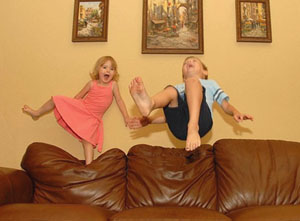
Children, above, acting like kids, below
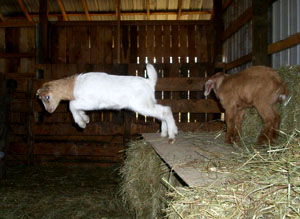 |
It certainly wasn’t common usage then. Kids was never used by a priest on the pulpit or a teacher in the classroom. Parents with any grain of culture did not call their children kids. The media – television and radio broadcasts, magazine, newspapers and even advertisements – shunned the term. Persons who prided themselves on a good English never used kids in their daily speech.
I remember the first time my mother heard one of my brothers use the term, she reacted energetically. “You are not kids,” she firmly told us – her children. “Kids are young goats. You are children.”
She was right. Kid comes from the Middle English kide, of Scandinavian origin; akin to Old Norse kidh, a young goat. This was the first definition in my 1969 American Heritage Dictionary. Only under the heading ‘Slang’ does it note that the word may also refer to “one especially younger or less experienced, e.g. the kid on the pro golf tour, or poor kid.” Today, if you go to an online dictionary, you find a subtle but important difference in the definition. The first meaning is still “a young goat.” But now, as a second or third definition - without the warning signal of slang - we are told that kid means a young person or child.
That is to say, what once was considered vulgar jargon is now being accepted as part of everyday speech. Today, unfortunately, almost everyone calls children kids. I have even heard traditional priests preaching: “Parents, if you want your kids to say their prayers, you have to give the example.”
A bulletin for conservative parents notes that “home schooling is working well for the kids, even though the practice is coming under increasing suspicion, and even attack, as in California.” How paradoxical, I think. The same traditional-minded groups who are fighting the vulgar, dumb-down influences of the schools are nonetheless adopting – and thereby legitimizing – the same vulgar, dumb-down jargon of the masses in their daily language.
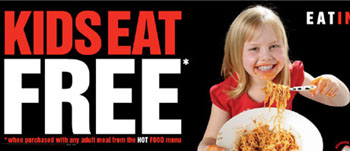
A child with spaghetti on her face and holding her fork incorrectly - a model ideal of a kid? |
The word is all-pervading – “Buy Big Kids or Little Kids shoes or boots.” The implication, of course, is that we are all kids – frolicking little goats that never grow up. Then there is the “Big Songs for Little Kids” – gospel music for little goats?
Even nice restaurants, museums and exhibitions have taken to using the term: “Kids’ meals available,” “Kids under 12 enter free.” Book titles justify the word for parents and offspring: we have Real Kids’ Readers, Diary of a Wimpy Kid, The Everything Kids’ Cookbook, and so on.
The dignity of man
I realize that there will be critics who think I am overstating the ills of saying kids and not children. “There she goes again, making a mountain out of a molehill, nitpicking about what to call your kids as the world falls apart around us.”
Children, not kids, please… No, I am not just being finicky and pernickety. There are certain principles at stake in the matter.
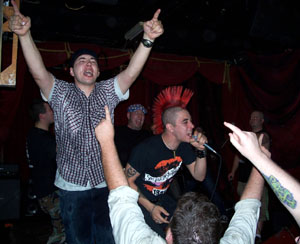
A youth culture that celebrates extravagant clothing and customs |
Today we hear much about the importance of the dignity of man. At the same time, we adopt language, customs and dress that persistently reduce the dignity of men and women.
Need I recall the daily clothing of men and women – the unisex sweat suit, the tiresome blue jean and t-shirt, the perpetual tennis shoes – that diminish the dignity of men and erase differences in professions and social levels? Not to mention the immoral women’s fashions that give even teenage girls the appearance of women of the street, not children of God.
Our customs have likewise been transformed: Gone are the formal greetings, the polite address of Mr. Jones or Miss Greene, gentlemen opening doors for ladies, and so on. The list is interminable and gloomy for those – like my good Readers – who oppose the hippy Cultural Revolution of the 1960s and do all they can to oppose and fight it in the ambiences of their own homes.
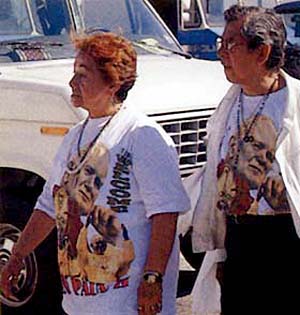
Big kids in JPII Superstar t-shirts... |
But the Cultural Revolution does not just influence customs and clothing. The same leveling, vulgarizing trend has found its way into daily language, habituating a generation to accept common and egalitarian forms of speech. Men and women are addressed ambiguously as guys. Persons are said to crack up instead of laugh. They are no longer described as blushing, but turning red. Instead of distinguishing an event with an appropriate adjective, everything is cool – to the point that the word has no meaning. And children are, of course, just kids.
Young goats... Unfortunately, the term applies in many cases. Many children prance around, careen and react spontaneously to every stimulus or feeling like mountain goats, instead of well-disciplined boys and girls. Perhaps there is a lesson in the tendencies to be learned here: If you anticipate your children acting like young goats, call them kids. If you want your offspring to behave with decorum and Catholic manners, please call them children.
Principles of Catholic Civilization
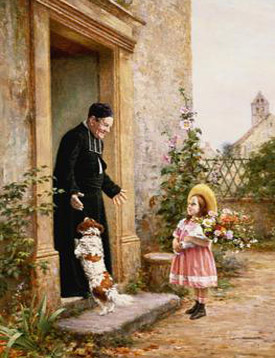
The charm of the past |
A final word for the unconvinced, especially for those traditional priests, teachers and parents who pretend to fight for the complete restoration of a Catholic civilization, but then resist any efforts to change modern customs and habits that feed the bad influences.
The normal fruit of a Catholic civilization should be to elevate man to the highest perfection that he can attain with the help of grace. In the past, this quest for perfection - trying to reflect God in everything - led to the constant refinement of man, not only in the order of knowledge and morals, but also in his customs, dress and language. Sad to say, there is an egalitarian tendency, even among traditionalists today, to reject those aspects that still speak of the quintessence and perfection in temporal society.
Today, an effective cultural counter-revolution should reaffirm refinement in the temporal life, in order to uphold the value of good language and customs and counter the prevailing tribalism and hippyism.
For those looking for a good- and challenging - New Year’s resolution, let me offer a suggestion, a discipline as valuable as a new fast or novena in my view. Try to elevate your language. One way to start is to make the conscious effort to eliminate from your daily speech this one ill-used term, and begin to say children, not kids.

Posted December 31, 2008

Related Topics of Interest
 Today's Big Boys Today's Big Boys
 The Era of the Child The Era of the Child
 Courtesy in the Catholic Home Courtesy in the Catholic Home
 Styles Reflect the Moral Profiles of Peoples and Epochs Styles Reflect the Moral Profiles of Peoples and Epochs
 Language Is the Dress of Thought Language Is the Dress of Thought
 The Role of Admiration and Affection in the Family The Role of Admiration and Affection in the Family
 Dressing Well- Vanity or Virtue? Dressing Well- Vanity or Virtue?
 Tradition, Stagnation and Progress Tradition, Stagnation and Progress
 Revolution and Counter-Revolution in the Tendencies, Ideas and Facts Revolution and Counter-Revolution in the Tendencies, Ideas and Facts

Related Works of Interest
|
|
Manners | Cultural | Home | Books | CDs | Search | Contact Us | Donate

© 2002- Tradition in Action, Inc. All Rights Reserved
|
 |

|